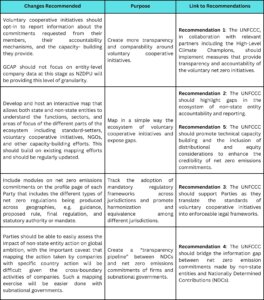Summary
The recommendations of co-Chairs Sarah Bloom Raskin and Bing Leng on the UNFCCC Recognition and Accountability Framework and its first Draft Implementation Plan are timely, balanced and ambitious. They focus on improving transparency of joint voluntary initiatives (that is, cooperative climate initiatives, rather than individual entities’), which C2ES has been advocating for, especially given their potential to inform the next round of NDCs. I would encourage the UNFCCC to take on these recommendations and start setting the ground for developing guidelines on what good accountability mechanisms (a step beyond transparency) could look like, for a greater push toward progress and implementation, in collaboration with relevant partners including the Marrakech Partnership and the High-Level Climate Champions.
On May 24—and in the context of the UNFCCC Recognition and Accountability Framework (RAF) and its first Draft Implementation Plan—Sarah Bloom Raskin and Bing Leng released the recommendations that UNFCCC Executive Secretary Simon Stiell invited them to produce following an inclusive stakeholder consultation process (the Recommendations).
The Recommendations outline the main challenges NPS face when considering participation in voluntary net zero initiatives, and suggest upgrading the United Nations Global Climate Action Portal (GCAP) in a way that usefully addresses such challenges.
The recommended changes for the GCAP are set out below:

The value-add of the GCAP would be to focus on providing complete, transparent and readily accessible information about voluntary climate cooperative initiatives (CCIs), comprised of voluntary initiatives including Parties and NPS, or coalitions of either.
Individual NPS net-zero emissions data, on the other hand, will be made available through an external global standardized repository in response to HLEG’s Recommendation 8 of the Integrity Matters report. The Net-Zero Data Public Utility (NZDPU) is currently being developed for this purpose.
Another point made by the Recommendations is for GCAP to ensure sufficient transparency of CCIs to improve understanding of the linkages between Nationally Determined Contributions (NDCs) and the efforts of the private sector and subnational governments. GCAP could help inform both the creation and fulfillment of national policies and regulation to achieve systems transformation, together with initiatives supporting countries with NDC design and tracking, such as the NDC Partnership and UNDP Climate Promise. The Recommendations recognize the ambition of the Coalition for High Ambition Multilevel Partnerships (CHAMP) initiative launched at COP28 in improving collaboration between subnational and national governments in updating NDCs.
These Recommendations expand beyond the mitigation and single entity scope of the RAF and Draft Implementation Plan published in June 2023, which propose guidelines and a roadmap to ensure greater transparency and accountability by non-Party stakeholders (NPS) against their net-zero pledges, transition plans and progress reporting, building on the work of the High-Level Expert Group on the Net Zero Emissions Commitments of Non-State Entities (HLEG), including through an upgrade of the GCAP.
The UNFCCC Executive Secretary will respond to the Recommendations in due time, including on ways to efficiently source information from voluntary initiatives to feed into the GCAP.
It is my hope that UNFCCC efforts on enhancing transparency of voluntary initiatives will transition to the development of guidelines for robust accountability mechanisms, aiming at accelerating progress and implementation based on the Recommendation’s recommended transparency improvements. One way of starting to do so would be, for example, to have GCAP collect information on what existing accountability mechanisms initiatives have put in place to ensure compliance with their climate goal, in addition to ways of tracking progress. Moreover, the broader climate ecosystem—including through the Marrakech Partnership and the High-Level Climate Champions—could support the UNFCCC’s capacity building efforts for entities wanting to join existing or establish new CCIs to enhance GCAP’s geographical coverage and support robust climate action worldwide.
I look forward to operationalizing these recommendations as I and others engage with NPS, particularly businesses and subnational governments, and supporting capacity building on transparency and accountability at the UNFCCC and broader climate ecosystem.

